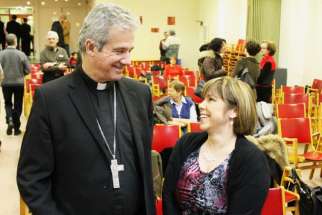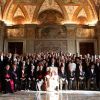WASHINGTON -- In a unanimous decision June 17, the Supreme Court said that a Catholic social service agency should not have been excluded from Philadelphia's foster care program because it did not accept same-sex couples as foster parents.
Why Russia's ban on Jehovah's Witnesses is so troubling
MOSCOW, Russia – The Jehovah's Witnesses have been banned as an extremist group in a Thursday Supreme Court decision that observers feared signalled a further step back for religious liberty.
VATICAN CITY - Europe's Christians must speak with one voice to defend religious liberty and to ensure desperate migrants are treated fairly, Pope Francis said.
Christianity's survival in Mideast highly unlikely
MONTREAL - The long-term survival of Christianity in the Middle East is threatened and “humanity in the region where Christianity was born will not be the same without it,” a spokesman for Aid to the Church in Need told a seminar in Montreal this week.
In eastern Ukraine, church has 'returned to catacombs,' spokesman says
WARSAW, Poland - Ukrainian Catholic leaders have warned their Church is being driven underground again, a quarter-century after it was re-legalized with the end of communist rule.
U.S. Church leaders pleased that U.S.-Cuba will rebuild relations
WASHINGTON - American Church officials expressed optimism about plans by the United States and Cuba to normalize diplomatic relations and work toward reshaping how the two neighbouring countries interact with each other.
VATICAN CITY - Deploring war, civil conflict and poverty around the world, Pope Benedict XVI told foreign ambassadors assembled at the Vatican that peace-building requires charity, religious liberty, a proper understanding of human rights and openness to divine love.
What changed at Vatican II
Things changed with the Second Vatican Council. No one disputes that the Catholic faith remained what it has always been. The Church still teaches what the Church always taught. But the Council did not assemble 2,860 bishops to recite the catechism. The fact that the bishops commissioned the first authoritative catechism in 350 years was just one of many changes initiated at the Council.
Among the most important changes:
- Liturgy: Vernacular languages were encouraged, especially for Scripture readings at Mass, which became far more extensive with added Old Testament readings and a cycle of three years which focusses on each of the three synoptic Gospels (Matthew, Luke and Mark). By 1969 the Novus Ordo Mass allowed priests for pastoral reasons to face the assembly, gave the celebrant a variety of eucharistic prayers, restored the sign of peace to the entire congregation, allowed for distribution of both the body and blood of Christ under the forms of bread and wine and moved tabernacles off the altars to a noble and prominent location elsewhere in the church or a separate chapel. By 1973 the International Commission for English in the Liturgy produced the first official translation of the New Mass, though various provisional translations had been circulating since the end of the Council.
- Ecumenism: Unitatis Redintegratio declared the ecumenical movement a good thing, encouraged Catholics to be part of it and referred to Eastern, Oriental and Protestant Christians as "separated brethren." In 1928 Pope Pius XI had condemned the ecumenical movement. From the Council of Trent until the Second Vatican Council Protestants were officially referred to as heretics.
- Democracy and religious liberty: In Dignitatis Humanae the Church for the first time recognized the conscience rights of all people to freedom of religion, and declared it was the responsibility of states to protect religious freedom with stable laws. The idea that the state should be neutral in religion, or that liberal democratic states could be entrusted to protect human dignity or even that there was any such thing as a right to religious freedom, had been condemned by Pope Pius IX.
- Relations with Jews: "The Jews should not be presented as rejected or accursed by God," said Nostra Aetate. The charge of deicide was unfounded. The New Covenant is not possible without Abraham's stock.
- Relations with other religions: "The Church rejects nothing that is true and holy in these religions," said Nostra Aetate.
- Religious Life: Sisters, brothers and religious order priests were to do two things — rediscover the original purpose of their religious order and adapt it to the modern world, said Perfectae Caritatis.
- Canon Law: The Council fathers ordered a revised and written code of canon law that was finally delivered under Pope John Paul II in 1983.







